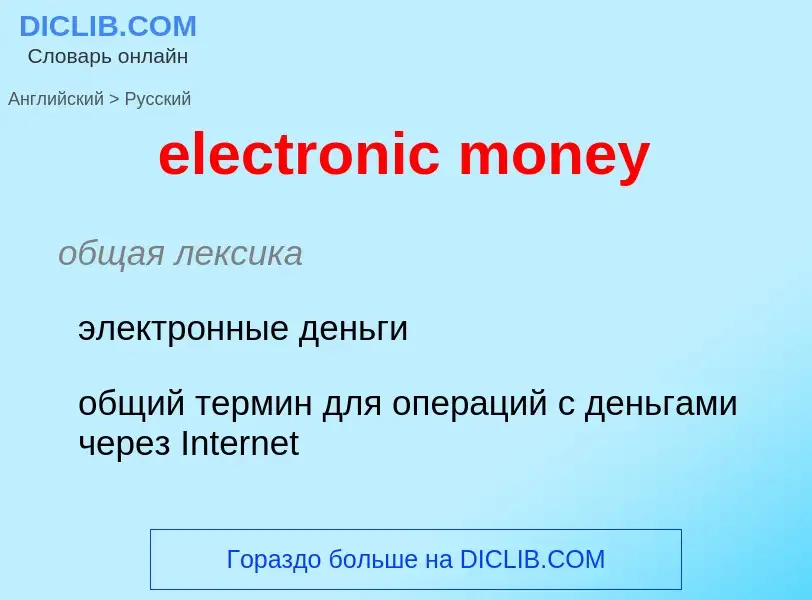Μετάφραση και ανάλυση λέξεων από την τεχνητή νοημοσύνη ChatGPT
Σε αυτήν τη σελίδα μπορείτε να λάβετε μια λεπτομερή ανάλυση μιας λέξης ή μιας φράσης, η οποία δημιουργήθηκε χρησιμοποιώντας το ChatGPT, την καλύτερη τεχνολογία τεχνητής νοημοσύνης μέχρι σήμερα:
- πώς χρησιμοποιείται η λέξη
- συχνότητα χρήσης
- χρησιμοποιείται πιο συχνά στον προφορικό ή γραπτό λόγο
- επιλογές μετάφρασης λέξεων
- παραδείγματα χρήσης (πολλές φράσεις με μετάφραση)
- ετυμολογία
electronic money - translation to Αγγλικά
общая лексика
электронные деньги
общий термин для операций с деньгами через Internet
синоним
общая лексика
электронная наличность, э-наличность
Реализуется в виде смарт-карты, которая может быть электронным кошельком (e-purse) или электронным портмоне (e-porte-monnaie), хранящим электронное представление наличных денег (MONDEX). Смарт-карта содержит в себе всю информацию, необходимую для авторизации операций с наличностью в ней, и используется для мелких бытовых расчетов типа оплаты проезда в городском транспорте, покупки газет и др.
синоним
Смотрите также
Смотрите также
Ορισμός
Βικιπαίδεια

Digital currency (digital money, electronic money or electronic currency) is any currency, money, or money-like asset that is primarily managed, stored or exchanged on digital computer systems, especially over the internet. Types of digital currencies include cryptocurrency, virtual currency and central bank digital currency. Digital currency may be recorded on a distributed database on the internet, a centralized electronic computer database owned by a company or bank, within digital files or even on a stored-value card.
Digital currencies exhibit properties similar to traditional currencies, but generally do not have a classical physical form of fiat currency historically that can be held in the hand, like currencies with printed banknotes or minted coins. However, they do have a physical form in an unclassical sense coming from the computer to computer and computer to human interactions and the information and processing power of the servers that store and keep track of money. This unclassical physical form allows nearly instantaneous transactions over the internet and vastly lowers the cost associated with distributing notes and coins: for example, of the types of money in the UK economy, 3% are notes and coins, and 79% as electronic money (in the form of bank deposits). Usually not issued by a governmental body, virtual currencies are not considered a legal tender and they enable ownership transfer across governmental borders.
This type of currency may be used to buy physical goods and services, but may also be restricted to certain communities such as for use inside an online game.
Digital money can either be centralized, where there is a central point of control over the money supply (for instance, a bank), or decentralized, where the control over the money supply is predetermined or agreed upon democratically.


